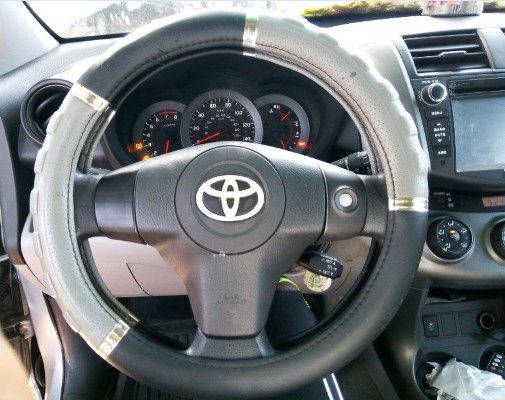

As we all may know, the phrase “get behind the wheel” is one of the most popular phrases about the topic of automobiles that those who can speak English may know. So, the person getting behind the wheel in a vehicle is very important and the wheel while getting the vehicle moving is accordingly important as well. The steering wheel system is a key part that connects the driver’s driving intentions to other parts of a vehicle that determines the car follows the driver’s plan.

The stiff steering wheel may cause major accidents when the driver finds it hard to put the car under control
With that being said, the breakdown of the steering wheel might paralyze the whole mechanism of the car. And sometimes, just a hesitant response from the steering wheel may steel the lives of many on the streets. So, today, Naijauto would like to share 6 reasons that lead to a stiff steering wheel.
What causes a stiff steering wheel
As the reasons for any problem in a car, the lack of regular maintenance is the major culprit of a slow-responding steering wheel. Other causes may be from some worn-off components inside the car that make the steering wheel rigid and requires more force to put it under control.
Reason # 1: Tire Pressure
Let’s zoom out our attention to something else, the tires! Yes, tire pressure actually makes it harder to control the steering wheel if they are not properly inflated. Consult your car manual for the recommended PSI.
Also, if the tires are unevenly worn, the car may pull to one side, which leads to harder handling behind the wheel. If the uneven tires are not replaced soon, I will affect the alignment which is connected to the steering system and also cost you more on fuel-filling, so it’s essential to schedule your tire change to keep it in mint condition.

Checking the tire pressure regularly not only makes sure the steering wheel at its top performance but also save your fuel money
Reason # 2: Damaged Serpentine Belt
Everything involving in a working mechanism is exposed to wearing out. The serpentine belt is not an exception. When it’s too much worn-out, the serpentine belt will kick off a stiff steering wheel.
Reason # 3: Fluid Leakage
When the pressurized hose area gets loose or leaking, the fluid will find the way through it, which reduces the pressure in the system, and dries out the pump. The lacking fluid is not sufficient for the wheel to handle well.
Video: How to Find Power Steering Leak in Your Car (Hose Replacement)
Reason # 4: Thick Fluid
The power steering fluid may accumulate dirt and debris. If you don’t schedule proper time for a fluid change, the fluid will become thick, which slows down the process of lubricating the components of the vehicles, which results in a hesitant steering wheel at low speeds.

The thick fluid for accumulated dirt and debris may lead to a hesitant steering wheel
Reason # 5: Pump Malfunction
Just like the fluid, the pump works to balance the pressure, so in the event of a broken pump comes the problem of the steering wheel, which requires more force to control the wheel and it’s risky if you have to take a quick swerve.
Reason # 6: Bad Steering Rack
The steering rack works in conjunction with a medley of U-joints and shafts. All of these components wear out throughout the times of use. The wore-out steering rack can be diagnosed by the sense of a stiffed wheel at the time of your starting the car. When you come across this feeling, don’t stretch your car’s suffering but bring it to an auto service shop right away.

The wore-out steering rack can be diagnosed by the sense of a stiffed wheel
How to diagnose the stiff steering wheel
The most detectable solution to diagnosing the problem of a stiff steering wheel is to travel at low speed as a matter of fact that people are wired to slow down before making a swerve or turn. If the resistance of the wheel was minified, it’s high time you checked Tire Pressure, Serpentine Belt, Fluid Leakage, Fluid thickness, Pump, and the Steering Rack.
Again, Naijauto.com has to one more time remind our beloved readers that “prevention is better than cure”. Always do regular maintenance and frequent checkups to keep your car in good condition.
